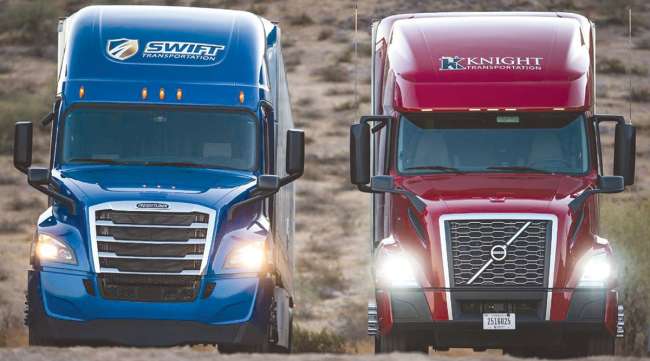Staff Reporter
M&A Trucking Market Weathers 2023 Headwinds

[Stay on top of transportation news: Get TTNews in your inbox.]
The trucking industry is facing merger and acquisition headwinds amid declining freight demand and rising interest rates, but deal buzz remains, experts said.
“There’s no lack of conversations, which is a good thing,” said Jonathan Britva, principal at Republic Partners. “There is a lack of a lot of deals getting done, and there [are] a number of factors that are playing a part in that. You can just see that the deal announcements in the first half of this year sort of pale in comparison to what we’ve seen the last few years.”
Advisory firm The Tenney Group said in a midyear report that some notable deals have taken place — in particular, Knight-Swift Transportation acquiring U.S. Xpress — but it also pointed to headwinds holding back the broader market. Tenney Group CEO Spencer Tenney noted that both buyers and sellers were very cautious during the first half of the year amid uncertain market conditions.

Tenney
“It became very challenging just to understand how to value a company when the freight market was tanking in the middle of a transaction,” he said. “Those types of effects within the freight market made it difficult for both buyers and sellers to have a meeting of the minds on value and how best to share risk around a transaction.” But Tenney noted that he has seen activity start to pick up with the market beginning to settle down.
Peter Stefanovich, president of Left Lane Associates, also stressed that the drop in freight rates affected valuations for businesses.

Stefanovich
“There’s definitely been a compression in multiples that are being offered for trucking companies because equipment values have also come down,” he said. “So that’s also caused the values of businesses to come down from an asset purchase perspective.”
Transportation and Logistics Advisors managing partner Lee A. Clair noted that lender trepidation has also contributed to the decline in deal activity, as interest rates increased so much that it became harder for lenders to price in risk. The double whammy of a freight slowdown and higher interest rates, he said, took a toll on valuations.

Clair
“They don’t know how the unprecedented rate increases are going to impact the companies that they’re loaning money to, so they stopped lending,” Clair said. “We actually had one M&A deal where the private equity client went out for debt to 13 lenders, and 12 came back no offer. The 13th one came back and said 12.5%, no more than 50% debt equity, callable in three years. There was no deal, obviously.”
“We’ve seen private equity firms and financial buyers maybe deem this environment to be too risky,” Britva said. “There’s more risk in the market, or at least they’re perceiving more risk to the cash flows of businesses. And frankly, a lot of companies in the transportation logistics space simply haven’t performed as well in 2023.”
Tenney believes the fundamental drivers of deal activity have not changed — companies still must figure out how to scale and create synergies if they hope to have a sustainable business. But how people approach deals and source capital has changed.

How effective have third-party services proved to be for fleets? Let's find out with Michael Precia of Fleetworthy Solutions and Dan Rutherford with Summit Virtual CFO by Anders. Tune in above or by going to RoadSigns.ttnews.com.
“How we get deals done is evolving,” Tenney said. “But nothing is changing about the fundamentals that are driving why deals are getting done. Costs are exploding, and you have to figure out how to offset that.”
Tenney pointed out that asset-based deals are easier to close in this environment since tangible collateral exists. That said, risk management is tricky right now as asset valuations drop. An exception, he noted, are larger carriers that have sufficient cash reserves to get deals done themselves.
Clair added that experienced deal-makers are succeeding.
“Many of them are strategic buyers, so they know the market, they know the business,” he said. “It also means they have synergy cost takeouts. You have one accounts payable department, I have one. We only need one, [so] one of them goes. They have leverage in synergy. Second of all, those deals, many of the companies getting acquired, are not in the best position financially.”
Overall, Britva noted that the slowdown in deal activity extends across the entire transportation landscape and includes both trucking and logistics firms.
“Last year, I’d say we closed our highest volume of transactions and highest deal fees in our firm’s history,” he said. “I think we closed 11 deals last year. This year, I don’t have a specific number to provide you, but we’re certainly not trending to the same levels as last year.”
Want more news? Listen to today's daily briefing below or go here for more info:




